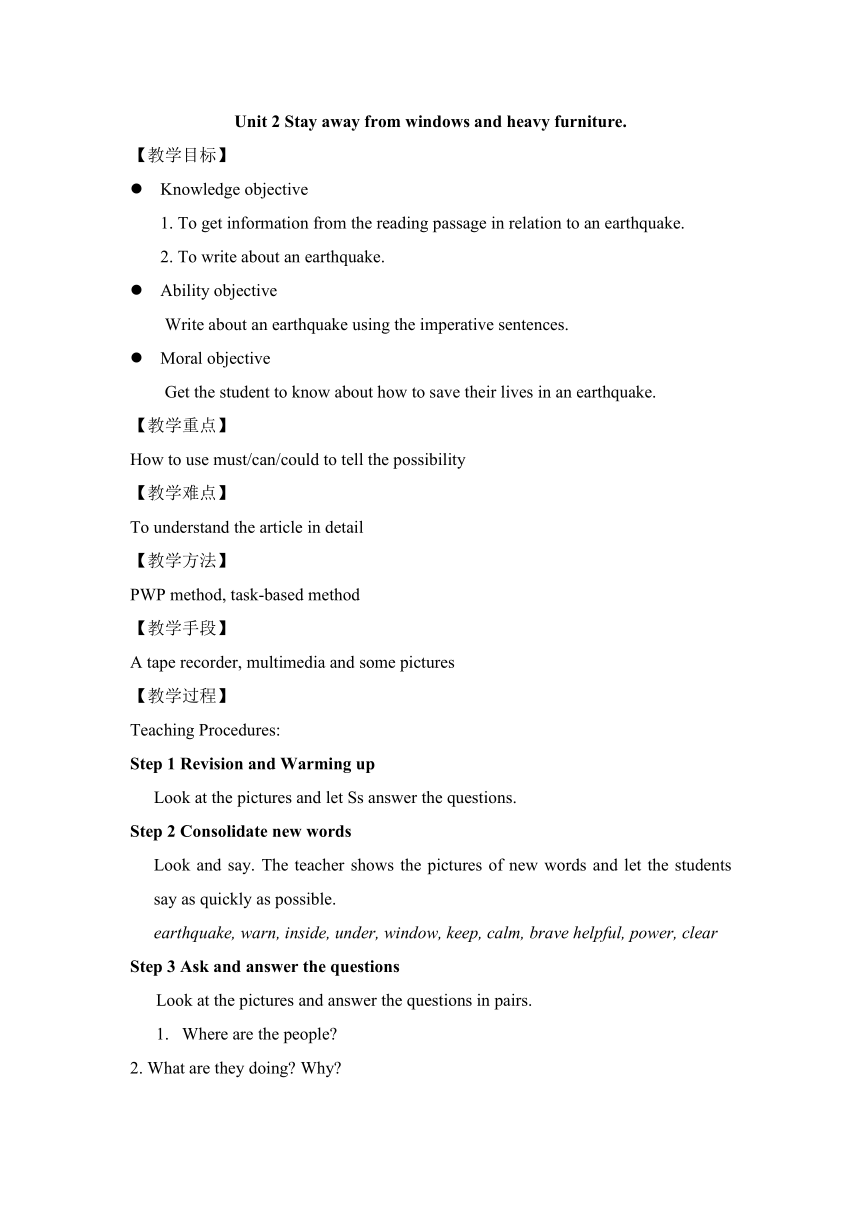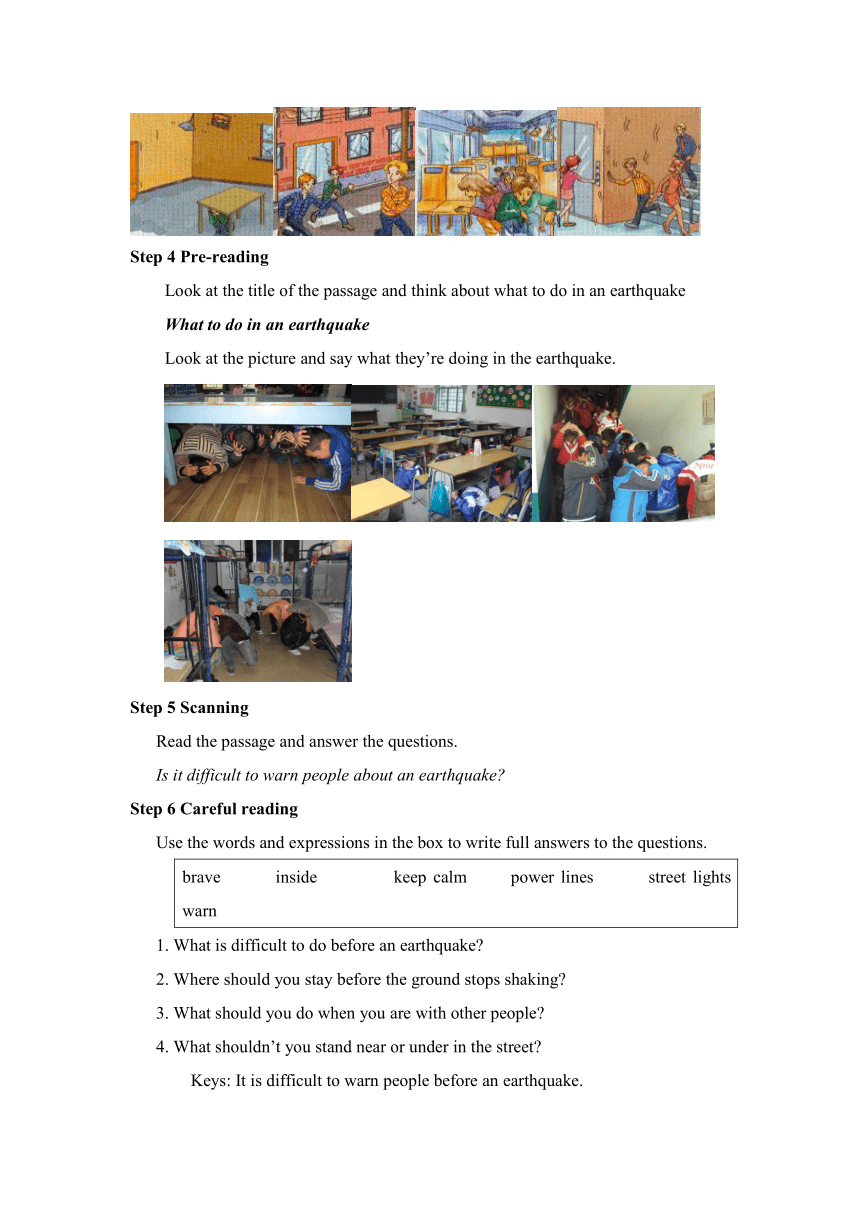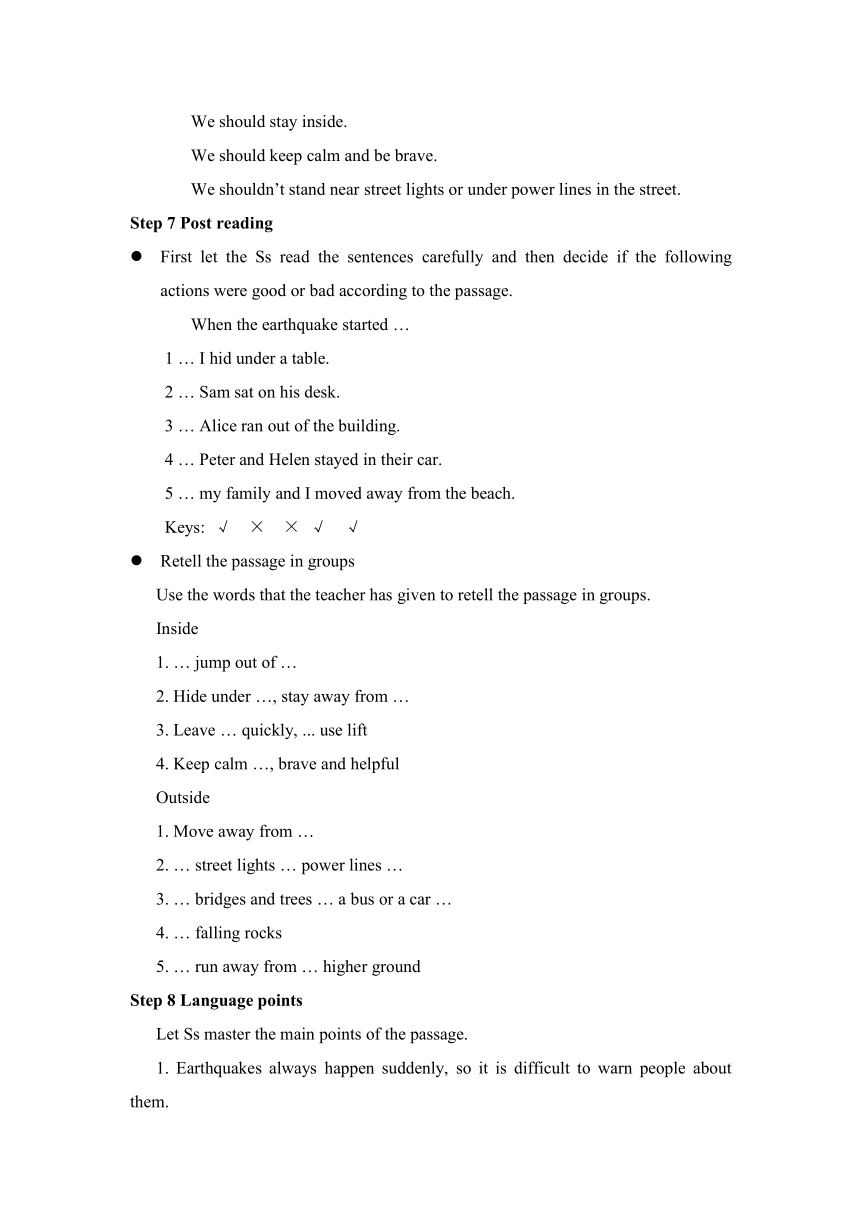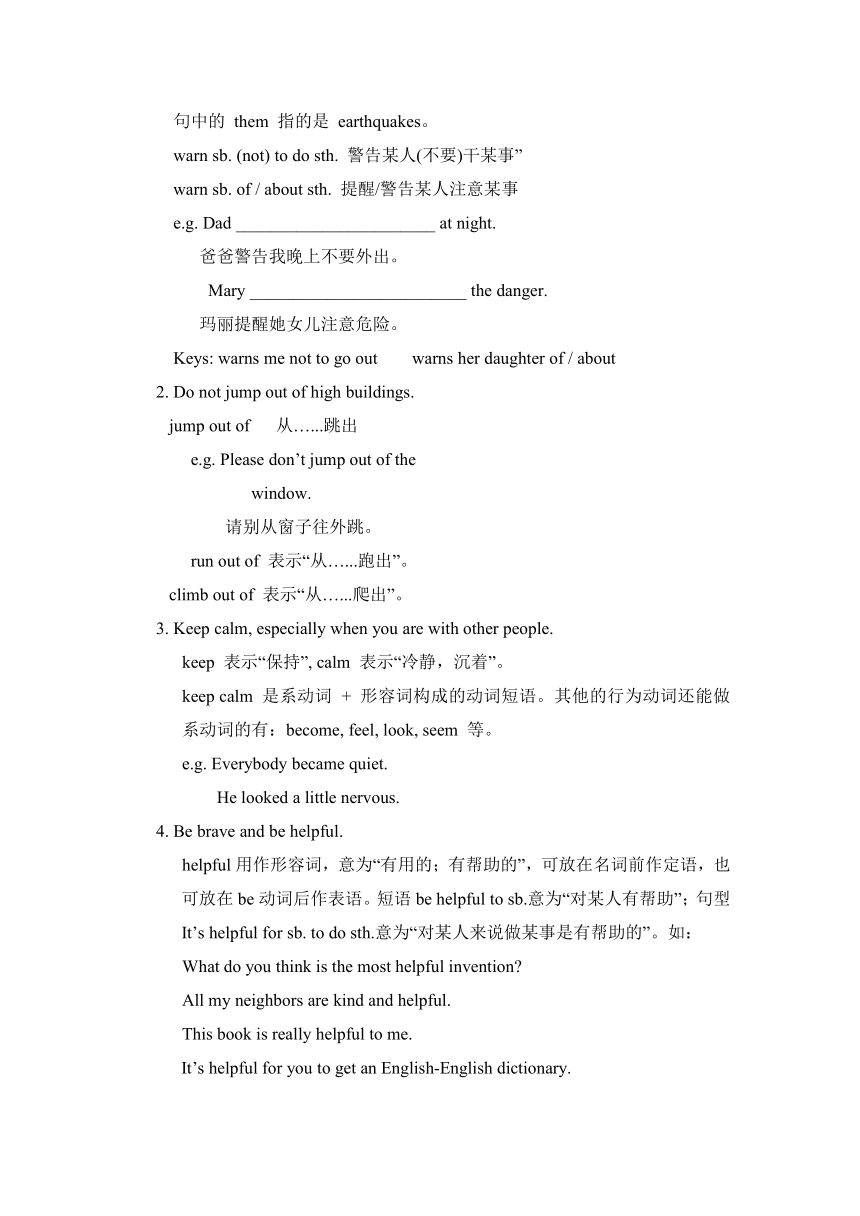外研版八年级英语上册Module12 Help Unit 2 Stay away from windows and heavy furniture. 教案
文档属性
| 名称 | 外研版八年级英语上册Module12 Help Unit 2 Stay away from windows and heavy furniture. 教案 |  | |
| 格式 | zip | ||
| 文件大小 | 1.0MB | ||
| 资源类型 | 教案 | ||
| 版本资源 | 外研版 | ||
| 科目 | 英语 | ||
| 更新时间 | 2017-07-18 14:07:48 | ||
图片预览




文档简介
Unit
2
Stay
away
from
windows
and
heavy
furniture.
【教学目标】
Knowledge
objective
1.
To
get
information
from
the
reading
passage
in
relation
to
an
earthquake.
2.
To
write
about
an
earthquake.
Ability
objective
Write
about
an
earthquake
using
the
imperative
sentences.
Moral
objective
Get
the
student
to
know
about
how
to
save
their
lives
in
an
earthquake.
【教学重点】
How
to
use
must/can/could
to
tell
the
possibility
【教学难点】
To
understand
the
article
in
detail
【教学方法】
PWP
method,
task-based
method
【教学手段】
A
tape
recorder,
multimedia
and
some
pictures
【教学过程】
Teaching
Procedures:
Step
1
Revision
and
Warming
up
Look
at
the
pictures
and
let
Ss
answer
the
questions.
Step
2
Consolidate
new
words
Look
and
say.
The
teacher
shows
the
pictures
of
new
words
and
let
the
students
say
as
quickly
as
possible.
earthquake,
warn,
inside,
under,
window,
keep,
calm,
brave
helpful,
power,
clear
Step
3
Ask
and
answer
the
questions
Look
at
the
pictures
and
answer
the
questions
in
pairs.
Where
are
the
people
2.
What
are
they
doing
Why
Step
4
Pre-reading
Look
at
the
title
of
the
passage
and
think
about
what
to
do
in
an
earthquake
What
to
do
in
an
earthquake
Look
at
the
picture
and
say
what
they’re
doing
in
the
earthquake.
Step
5
Scanning
Read
the
passage
and
answer
the
questions.
Is
it
difficult
to
warn
people
about
an
earthquake
Step
6
Careful
reading
Use
the
words
and
expressions
in
the
box
to
write
full
answers
to
the
questions.
brave
inside
keep
calm
power
lines
street
lights
warn
1.
What
is
difficult
to
do
before
an
earthquake
2.
Where
should
you
stay
before
the
ground
stops
shaking
3.
What
should
you
do
when
you
are
with
other
people
4.
What
shouldn’t
you
stand
near
or
under
in
the
street
Keys:
It
is
difficult
to
warn
people
before
an
earthquake.
We
should
stay
inside.
We
should
keep
calm
and
be
brave.
We
shouldn’t
stand
near
street
lights
or
under
power
lines
in
the
street.
Step
7
Post
reading
First
let
the
Ss
read
the
sentences
carefully
and
then
decide
if
the
following
actions
were
good
or
bad
according
to
the
passage.
When
the
earthquake
started
…
1
…
I
hid
under
a
table.
2
…
Sam
sat
on
his
desk.
3
…
Alice
ran
out
of
the
building.
4
…
Peter
and
Helen
stayed
in
their
car.
5
…
my
family
and
I
moved
away
from
the
beach.
Keys:
√
×
×
√
√
Retell
the
passage
in
groups
Use
the
words
that
the
teacher
has
given
to
retell
the
passage
in
groups.
Inside
1.
…
jump
out
of
…
2.
Hide
under
…,
stay
away
from
…
3.
Leave
…
quickly,
...
use
lift
4.
Keep
calm
…,
brave
and
helpful
Outside
1.
Move
away
from
…
2.
…
street
lights
…
power
lines
…
3.
…
bridges
and
trees
…
a
bus
or
a
car
…
4.
…
falling
rocks
5.
…
run
away
from
…
higher
ground
Step
8
Language
points
Let
Ss
master
the
main
points
of
the
passage.
1.
Earthquakes
always
happen
suddenly,
so
it
is
difficult
to
warn
people
about
them.
句中的
them
指的是
earthquakes。
warn
sb.
(not)
to
do
sth.
警告某人(不要)干某事”
warn
sb.
of
/
about
sth.
提醒/警告某人注意某事
e.g.
Dad
_______________________
at
night.
爸爸警告我晚上不要外出。
Mary
_________________________
the
danger.
玛丽提醒她女儿注意危险。
Keys:
warns
me
not
to
go
out
warns
her
daughter
of
/
about
2.
Do
not
jump
out
of
high
buildings.
jump
out
of
从…...跳出
e.g.
Please
don’t
jump
out
of
the
window.
请别从窗子往外跳。
run
out
of
表示“从…...跑出”。
climb
out
of
表示“从…...爬出”。
3.
Keep
calm,
especially
when
you
are
with
other
people.
keep
表示“保持”,
calm
表示“冷静,沉着”。
keep
calm
是系动词
+
形容词构成的动词短语。其他的行为动词还能做系动词的有:become,
feel,
look,
seem
等。
e.g.
Everybody
became
quiet.
He
looked
a
little
nervous.
4.
Be
brave
and
be
helpful.
helpful用作形容词,意为“有用的;有帮助的”,可放在名词前作定语,也可放在be动词后作表语。短语be
helpful
to
sb.意为“对某人有帮助”;句型It’s
helpful
for
sb.
to
do
sth.意为“对某人来说做某事是有帮助的”。如:
What
do
you
think
is
the
most
helpful
invention
All
my
neighbors
are
kind
and
helpful.
This
book
is
really
helpful
to
me.
It’s
helpful
for
you
to
get
an
English-English
dictionary.
【运用】选词填空。
(1)
I
think
the
experience
will
be
helpful
_______
(to
/
at)
her.
to
(2)
Jenny,
here
is
some
_______
(help
/
helpful)
information.
helpful
(3)
It’s
helpful
_______
(to
/
for)
May
to
see
this
film.
for
5.
In
short,
follow
what
you
learnt
in
school.
in
short
总之,简言之
e.g.
In
short,
I
am
interested
in
all
of
the
sports.
This
book
is,
in
short,
an
exciting
story
about
adventures.
Step
9
Learning
to
learn
Master
how
to
write
instructions.
When
you
read
instructions,
make
sure
of
what
they
tell
you
to
do,
and
also
focus
on
the
steps
of
activities.
Step
10
Do
researching
Do
the
following
research
inside
your
school
and
outside
your
school
in
pairs.
Inside
your
school
Make
a
list
of
safe
places
and
dangerous
places
at
your
school
if
an
earthquake
happens.
Note
where
the
nearest
stairs
and
doors
to
the
outside
of
the
school
buildings
are.
Outside
your
school
Make
a
list
of
places
near
your
school.
Note
if
they
are
safe
or
dangerous.
Note
where
the
streets
go,
and
where
street
lights
and
power
lines
are.
Step
11
Writing
1.
Write
some
instructions
about
what
to
do
in
an
earthquake.
Go
out
and
meet
on
the
playground.
Don’t
use
the
lift.
2.
Now
work
in
pairs
and
check
your
instructions.
Step
12
Grammar
祈使句
一、定义:
祈使句表达说话人对对方的叮嘱、劝告、希望、禁止、建议、请求或命令等。
二、祈使句的特征:
以动词原形开头,无时态和数的变化。
三、祈使句的句型:
1.
动词原形构成的祈使句
通常省略主语you,谓语动词用原形。否定句由don’t
或never开头。祈使句的句首或句末有时加
please。
2.
let构成的祈使句
由“Let
+
me/us/him/her+动词原形”构成。这类祈使句往往用于请求允许(let
us)或提出建议(let’s)。
例如:
Let’s
spend
this
weekend
in
the
countryside.
Let
him
be
here
by
ten
o’clock.
3.
无动词祈使句
在请求,命令和口号中,常用无动词祈使句,它实际上是省略了动词,从而使语句更简洁有力。
例如:
Just
a
minute,
please!
在一些指示牌上,常用“No
+
动名词/名词”构成省略的否定祈使句。
例如:No
smoking!
Step
13
中考链接
1.
—Put
some
butter
on
a
slice
of
bread
and
add
a
teaspoon
of
butter.
What
else
—Next
_____
some
tomatoes.
(2014
湖北黄冈)
A.
cut
up
B.
cuts
up
C.
to
cut
up
D.
cutting
up
2.
—Sorry
I’m
late.
—_____
tell
me
the
bus
broke
down
again!
(2014广东广州)
A.
Never
to
B.
Not
C.
Don’t
D.
No
3.
_____
wake
up
your
sister,
Ben.
She
needs
a
good
sleep.
(2014重庆)
A.
Don’t
B.
Doesn’t
C.
Aren’t
D.
Can’t
4.
_____
carefully,
Michael!
There’s
a
school
ahead.
(2014
上海)
A.
Drive
B.
To
drive
C.
Drove
D.
Driving
5.
“_____
run
in
the
hallways,
Mike.”
“Sorry,
Ms
Clark.”
(2014
贵州贵阳)
A.
Don’t
B.
Please
C.
Let’s
Keys:
ACAAA
Step
14
Exercises
Ⅰ.
根据语境选出下列恰当的单词填空。
under,
earthquake,
inside,
power
1.
Oh,
there
was
a
big
_________
in
Ludian
and
lots
of
people
died
because
of
it.
2.
—Can
you
see
my
dog
—Yeah!
It’s
______
your
father’s
chair.
3.
Look
out!
There
are
some
_________
lines
on
the
ground.
4.
—What’s
in
the
box
—I
don’t
know.
I
only
saw
the
outside
of
the
box
but
I
didn’t
see
the
_________
of
it.
Ⅱ.
根据句意用括号内所给单词的适当形式填空。
1.
This
dictionary
is
_________
(help)
to
your
study.
2.
I
think
Mike
is
much
_________
(brave)
than
his
brother.
3.
You
should
do
sports
every
day
_________
(keep)
fit.
4.
Close
the
two
_________
(window)
before
leaving
the
lab.
5.
Who
looks
even
_________
(calm),
Jerry
or
Mary
6.
Yesterday
my
dad
_________
(warn)
me
not
to
use
his
computer
for
the
computer
games.
Step
15
Homework
近几年频频发生的地震,导致无数人失去家园。请阐述一下如何对这一灾害进行防范。
2
Stay
away
from
windows
and
heavy
furniture.
【教学目标】
Knowledge
objective
1.
To
get
information
from
the
reading
passage
in
relation
to
an
earthquake.
2.
To
write
about
an
earthquake.
Ability
objective
Write
about
an
earthquake
using
the
imperative
sentences.
Moral
objective
Get
the
student
to
know
about
how
to
save
their
lives
in
an
earthquake.
【教学重点】
How
to
use
must/can/could
to
tell
the
possibility
【教学难点】
To
understand
the
article
in
detail
【教学方法】
PWP
method,
task-based
method
【教学手段】
A
tape
recorder,
multimedia
and
some
pictures
【教学过程】
Teaching
Procedures:
Step
1
Revision
and
Warming
up
Look
at
the
pictures
and
let
Ss
answer
the
questions.
Step
2
Consolidate
new
words
Look
and
say.
The
teacher
shows
the
pictures
of
new
words
and
let
the
students
say
as
quickly
as
possible.
earthquake,
warn,
inside,
under,
window,
keep,
calm,
brave
helpful,
power,
clear
Step
3
Ask
and
answer
the
questions
Look
at
the
pictures
and
answer
the
questions
in
pairs.
Where
are
the
people
2.
What
are
they
doing
Why
Step
4
Pre-reading
Look
at
the
title
of
the
passage
and
think
about
what
to
do
in
an
earthquake
What
to
do
in
an
earthquake
Look
at
the
picture
and
say
what
they’re
doing
in
the
earthquake.
Step
5
Scanning
Read
the
passage
and
answer
the
questions.
Is
it
difficult
to
warn
people
about
an
earthquake
Step
6
Careful
reading
Use
the
words
and
expressions
in
the
box
to
write
full
answers
to
the
questions.
brave
inside
keep
calm
power
lines
street
lights
warn
1.
What
is
difficult
to
do
before
an
earthquake
2.
Where
should
you
stay
before
the
ground
stops
shaking
3.
What
should
you
do
when
you
are
with
other
people
4.
What
shouldn’t
you
stand
near
or
under
in
the
street
Keys:
It
is
difficult
to
warn
people
before
an
earthquake.
We
should
stay
inside.
We
should
keep
calm
and
be
brave.
We
shouldn’t
stand
near
street
lights
or
under
power
lines
in
the
street.
Step
7
Post
reading
First
let
the
Ss
read
the
sentences
carefully
and
then
decide
if
the
following
actions
were
good
or
bad
according
to
the
passage.
When
the
earthquake
started
…
1
…
I
hid
under
a
table.
2
…
Sam
sat
on
his
desk.
3
…
Alice
ran
out
of
the
building.
4
…
Peter
and
Helen
stayed
in
their
car.
5
…
my
family
and
I
moved
away
from
the
beach.
Keys:
√
×
×
√
√
Retell
the
passage
in
groups
Use
the
words
that
the
teacher
has
given
to
retell
the
passage
in
groups.
Inside
1.
…
jump
out
of
…
2.
Hide
under
…,
stay
away
from
…
3.
Leave
…
quickly,
...
use
lift
4.
Keep
calm
…,
brave
and
helpful
Outside
1.
Move
away
from
…
2.
…
street
lights
…
power
lines
…
3.
…
bridges
and
trees
…
a
bus
or
a
car
…
4.
…
falling
rocks
5.
…
run
away
from
…
higher
ground
Step
8
Language
points
Let
Ss
master
the
main
points
of
the
passage.
1.
Earthquakes
always
happen
suddenly,
so
it
is
difficult
to
warn
people
about
them.
句中的
them
指的是
earthquakes。
warn
sb.
(not)
to
do
sth.
警告某人(不要)干某事”
warn
sb.
of
/
about
sth.
提醒/警告某人注意某事
e.g.
Dad
_______________________
at
night.
爸爸警告我晚上不要外出。
Mary
_________________________
the
danger.
玛丽提醒她女儿注意危险。
Keys:
warns
me
not
to
go
out
warns
her
daughter
of
/
about
2.
Do
not
jump
out
of
high
buildings.
jump
out
of
从…...跳出
e.g.
Please
don’t
jump
out
of
the
window.
请别从窗子往外跳。
run
out
of
表示“从…...跑出”。
climb
out
of
表示“从…...爬出”。
3.
Keep
calm,
especially
when
you
are
with
other
people.
keep
表示“保持”,
calm
表示“冷静,沉着”。
keep
calm
是系动词
+
形容词构成的动词短语。其他的行为动词还能做系动词的有:become,
feel,
look,
seem
等。
e.g.
Everybody
became
quiet.
He
looked
a
little
nervous.
4.
Be
brave
and
be
helpful.
helpful用作形容词,意为“有用的;有帮助的”,可放在名词前作定语,也可放在be动词后作表语。短语be
helpful
to
sb.意为“对某人有帮助”;句型It’s
helpful
for
sb.
to
do
sth.意为“对某人来说做某事是有帮助的”。如:
What
do
you
think
is
the
most
helpful
invention
All
my
neighbors
are
kind
and
helpful.
This
book
is
really
helpful
to
me.
It’s
helpful
for
you
to
get
an
English-English
dictionary.
【运用】选词填空。
(1)
I
think
the
experience
will
be
helpful
_______
(to
/
at)
her.
to
(2)
Jenny,
here
is
some
_______
(help
/
helpful)
information.
helpful
(3)
It’s
helpful
_______
(to
/
for)
May
to
see
this
film.
for
5.
In
short,
follow
what
you
learnt
in
school.
in
short
总之,简言之
e.g.
In
short,
I
am
interested
in
all
of
the
sports.
This
book
is,
in
short,
an
exciting
story
about
adventures.
Step
9
Learning
to
learn
Master
how
to
write
instructions.
When
you
read
instructions,
make
sure
of
what
they
tell
you
to
do,
and
also
focus
on
the
steps
of
activities.
Step
10
Do
researching
Do
the
following
research
inside
your
school
and
outside
your
school
in
pairs.
Inside
your
school
Make
a
list
of
safe
places
and
dangerous
places
at
your
school
if
an
earthquake
happens.
Note
where
the
nearest
stairs
and
doors
to
the
outside
of
the
school
buildings
are.
Outside
your
school
Make
a
list
of
places
near
your
school.
Note
if
they
are
safe
or
dangerous.
Note
where
the
streets
go,
and
where
street
lights
and
power
lines
are.
Step
11
Writing
1.
Write
some
instructions
about
what
to
do
in
an
earthquake.
Go
out
and
meet
on
the
playground.
Don’t
use
the
lift.
2.
Now
work
in
pairs
and
check
your
instructions.
Step
12
Grammar
祈使句
一、定义:
祈使句表达说话人对对方的叮嘱、劝告、希望、禁止、建议、请求或命令等。
二、祈使句的特征:
以动词原形开头,无时态和数的变化。
三、祈使句的句型:
1.
动词原形构成的祈使句
通常省略主语you,谓语动词用原形。否定句由don’t
或never开头。祈使句的句首或句末有时加
please。
2.
let构成的祈使句
由“Let
+
me/us/him/her+动词原形”构成。这类祈使句往往用于请求允许(let
us)或提出建议(let’s)。
例如:
Let’s
spend
this
weekend
in
the
countryside.
Let
him
be
here
by
ten
o’clock.
3.
无动词祈使句
在请求,命令和口号中,常用无动词祈使句,它实际上是省略了动词,从而使语句更简洁有力。
例如:
Just
a
minute,
please!
在一些指示牌上,常用“No
+
动名词/名词”构成省略的否定祈使句。
例如:No
smoking!
Step
13
中考链接
1.
—Put
some
butter
on
a
slice
of
bread
and
add
a
teaspoon
of
butter.
What
else
—Next
_____
some
tomatoes.
(2014
湖北黄冈)
A.
cut
up
B.
cuts
up
C.
to
cut
up
D.
cutting
up
2.
—Sorry
I’m
late.
—_____
tell
me
the
bus
broke
down
again!
(2014广东广州)
A.
Never
to
B.
Not
C.
Don’t
D.
No
3.
_____
wake
up
your
sister,
Ben.
She
needs
a
good
sleep.
(2014重庆)
A.
Don’t
B.
Doesn’t
C.
Aren’t
D.
Can’t
4.
_____
carefully,
Michael!
There’s
a
school
ahead.
(2014
上海)
A.
Drive
B.
To
drive
C.
Drove
D.
Driving
5.
“_____
run
in
the
hallways,
Mike.”
“Sorry,
Ms
Clark.”
(2014
贵州贵阳)
A.
Don’t
B.
Please
C.
Let’s
Keys:
ACAAA
Step
14
Exercises
Ⅰ.
根据语境选出下列恰当的单词填空。
under,
earthquake,
inside,
power
1.
Oh,
there
was
a
big
_________
in
Ludian
and
lots
of
people
died
because
of
it.
2.
—Can
you
see
my
dog
—Yeah!
It’s
______
your
father’s
chair.
3.
Look
out!
There
are
some
_________
lines
on
the
ground.
4.
—What’s
in
the
box
—I
don’t
know.
I
only
saw
the
outside
of
the
box
but
I
didn’t
see
the
_________
of
it.
Ⅱ.
根据句意用括号内所给单词的适当形式填空。
1.
This
dictionary
is
_________
(help)
to
your
study.
2.
I
think
Mike
is
much
_________
(brave)
than
his
brother.
3.
You
should
do
sports
every
day
_________
(keep)
fit.
4.
Close
the
two
_________
(window)
before
leaving
the
lab.
5.
Who
looks
even
_________
(calm),
Jerry
or
Mary
6.
Yesterday
my
dad
_________
(warn)
me
not
to
use
his
computer
for
the
computer
games.
Step
15
Homework
近几年频频发生的地震,导致无数人失去家园。请阐述一下如何对这一灾害进行防范。
同课章节目录
- Module 1 How to learn English
- Unit 1 Let's try to speak English as much as possi
- Unit 2 You should smile at her.
- Unit 3 Language in use .
- Module 2 My home town and my country
- Unit 1 It's taller than many other buildings.
- Unit 2 Cambridge is a beautiful city in the east o
- Unit 3 Language in use .
- Module 3 Sports.
- Unit 1 Nothing is more exciting than playing tenni
- Unit 2 This year we training more carefully.
- Unit 3 Language in use .
- Module 4 Planes, ships and trains .
- Unit 1 He lives the farthest from school.
- Unit 2 What is the best way to travel.
- Unit 3 Language in use .
- Module 5 Lao She Teahouse.
- Unit 1 I wanted to see the Beijing Opera.
- Unit 2 It descibes the changes in Chinese society.
- Unit 3 Language in use .
- Module 6 Animals in danger.
- Unit 1 It allows people to get closer to them .
- Unit 2 The WWF is working hard to save them all.
- Unit 3 Language in use .
- Revision module A
- Module 7 A famous story
- Unit 1 Alice was sitting with her sister by the ri
- Unit 2 She was thinking about her cat.
- Unit 3 Language in use .
- Module 8 Accidents
- Unit 1 While the car were changing to red, a car s
- Unit 2 I was trying to pick it up when it bite me
- Unit 3 Language in use .
- Module 9 Population
- Unit 1 The population of China is about 1.37 billi
- Unit 2 Arnwick was a city with 200,000 people.
- Unit 3 Language in use .
- Module 10 The weathe
- Unit 1 It might snow.
- Unit 2 The weather is fine all year round.
- Unit 3 Language in use .
- Module 11 Way of life
- Unit 1 In China ,we open a gift later.
- Unit 2 In England, you usually drink tea with milk
- Unit 3 Language in use .
- Module 12 Help
- Unit 1 What should we do before help arrives?
- Unit 2 Stay away from windows and heavy furniture.
- Unit 3 Language in use .
- Revision module B
